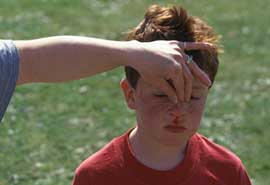
Nosebleeds causes and Self-Care
Nosebleeds are common and usually are not a medical problem. A nose bleed occurs when a small vein, along the lining of nose, bursts. Nosebleeds maybe caused by hardened arteries or high blood pressure in older adults, originating deeper in the nose. These nosebleeds are unprompted and are difficult to stop.
Some Other Causes:
- Dryness
- Nose picking or poking with objects
- Blowing nose with force
- Use of medications, e.g. aspirin
- Trauma
- Allergies
- Infections
- High blood pressure
- Blood-clotting disorders
Self-Care at Home
- To reduce blood pressure and avoid swallowing blood, sit upright and lean forward.
- Use the thumb and index finger to pinch the soft part of nose (five to ten minutes) and breathe through the mouth. If bleeding doesn’t stop, hold for another ten minutes.
- Don't irritate the nose (picking at it, rubbing or blowing it) to prevent re-bleeding. Also, for the next few hours, try to keep from lowering your head.
- If your nose starts bleeding again, blow out to clear any blood clots in the nose. If you can, before pinching your nose, spray both sides of your nose with a decongestant nasal spray that contains oxymetazoline (e.g. Afrin).
- Apply a water-based lubricant to your nostrils and increase the humidity in your home to help relieve nasal bleeding.
- When to seek immediate medical care?
- If despite the self-care, the bleeding continues for more than 20 minutes.
- If the nosebleed resulted from an accident to your head.
- If you experience frequent nosebleeds.
- If you are experiencing nasal bleeding and are taking blood thinners, such as aspirin.


